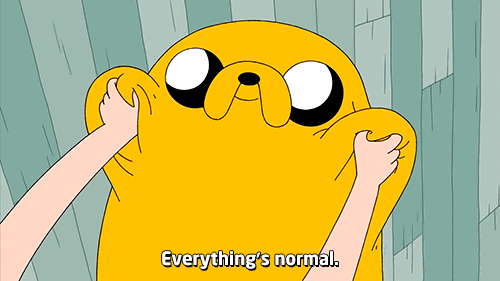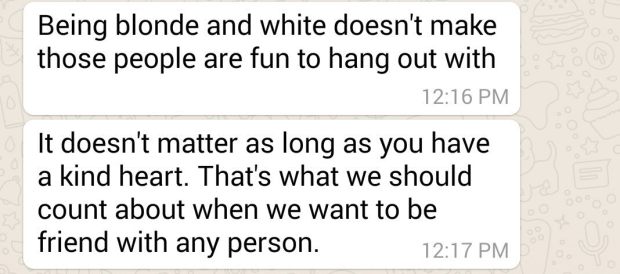Recently, I’ve been worried about one of my students, a Form 4 boy that I work closely with as part of my social entrepreneurship team. I found out that, as the lead in the BM drama production, he’s been practicing with the team from 8 pm to 10 pm almost every night, and even longer on weekends. This is on top of his regular prefect duties – which may be more than other prefects’, since he’s been tapped to become head prefect – and his academic responsibilities as one of the top students in Form 4, not to mention his role as team leader in our social entrepreneurship project. And now that all of the students are in exams, those long, late-night practices seem even more absurd. I’ve often wondered why he doesn’t ask to be excused from drama, at least for one or two days out of the week. Even with the drama competition looming, the students’ first priority should be their academics.

An interaction on the group chat a few weeks ago. And it hasn’t gotten better since then.
I complained to a fellow SETA that this boy was just really bad at saying no. She made a comment about students reflecting their ETAs. My instinct was to deny it – this kid was much too nice and cooperative of a person to be anything like me.
But then I thought back. Once, I stood out in the blazing sun for two hours in a wedding dress, just because some teachers had asked me to participate in a mascot parade. Once, I edited 21 Form 5 students’ exchange program personal statements for a month, then skipped classes for three hours in the last week so that I could scan all of their applications. Once, I spent one and a half weeks preparing with the debate team, making them snacks and staying at school for over ten hours each day.
When “once” happens so many times, it ceases to become a one-time occurrence, and becomes a pattern.
My student and I are both bad at saying no. Even when we know it’s not a good idea, like when he’s asked to skip extra class, during exams, in favor of drama practice, or when I’m asked to write a two-page poem the same weekend that I’m hosting an English camp, we still say yes. And then we pay the price.

#same
I wonder why this student chooses to do so much, when being slightly less busy would not make anyone think less of him. I think he just wants to be included, to be needed. Maybe he craves the feeling of being an indispensable part of a whole. Maybe he’s worried about what kind of thoughts might enter his head, should he have too much time to sit and think by himself. Or maybe I’m just projecting.
I have to admit that I’ve enjoyed staying busy. When I pack every day to the bursting point, I return home feeling exhausted but happy, satisfied with how much progress I am making with my students. But I also worry about myself. I worry about how I can’t seem to return to a normal sleep schedule, despite how tired I am all the time. I worry about how I eat greasy, fried takeout instead of expending the effort to make a healthy meal at home. I worry about all the emails from my mother. “How are you? I haven’t heard from you in a long time, please call me.” “Your grandma has been asking about you. Can you call her when you have time?” “Have you called your grandma yet?”
I worry about the resentment that always seems so close to the surface these days. I used to be made up of gentle, forgiving curves, but now I feel jagged and brittle. Everything bothers me.
The way that students assume that I have unlimited free time to spend with them, and then grow angry when I tell them that I have too much work. As though I am a playmate, or perhaps a plaything, rather than an adult with responsibilities.
The way that, even in my second year, people still ask me the same questions.
Looking down at my plate: “Oh! You take rice??”
Watching me spoon sambal onto my vegetables: “You like spicy?”
Peering at my face: “Why you look Chinese?” Always, always, always this question.
The way my work is not taken seriously, because I am not a “serious teacher.” I am the “fun” teacher, the one who brings her guitar to class, who plays games that involve a lot of screaming and laughter. So students don’t listen when I ask them to sit down and try writing a poem for once. They complain, “Teacher, so hard,” with their pencils lying untouched on their desks. They moan and loll their heads sideways and clamor for a song. And when I pack up their quarter-finished poems and prepare to leave, they ask hopefully, “Next week, singing?”
The way that people marvel at the way my roommate speaks BM, but assume that, despite having lived here for over a year, I don’t understand when they gossip about me behind my back, or sometimes right in front of my face. The male teachers mutter, “Dia malu, juga tak paham Bahasa Melayu” as I pass by, and it’s only in my head that I say, “Ya, saya malu, tapi saya paham Bahasa Melayu, kerana saya tak bodoh.” Optional add-on: “You assholes.”
When I first began writing this post, I thought these feelings were signs of burnout. But now I realize it was a misdiagnosis. Burnout would leave me feeling apathetic and unable to see the point in attending school. I don’t feel that way. I’m still excited to see the majority of my students, and planning for future events is still satisfying work. But I’ve found that I’ve taken on too heavy a workload at school, and as a result, the other parts of my life suffer.
Just over a week ago, my room was an absolute mess. There were dirty clothes and rumpled sheets overflowing the laundry basket, countless empty plastic bottles around my desk, a too-full trash can next to my bed. Swirled into the bathroom drain was a hairball roughly the size of my fist. Loose papers, limned with dust, fluttered weakly on the floor whenever I turned on the fan. It was a good enough reflection for the state of my mind: I’d been too busy that week, too busy for the past month, to sit down and clean up all the clutter.
My life has been full of clutter. There’s my room, and then there’s the kitchen sink, stacked with dishes that I avoid looking at because I’m just too tired to take care of them. There’s the kitchen trashcan, packed to bursting with take-out containers to replace the meals I’ve grown too busy to cook. There’s my purse, where I keep finding old receipts, empty candy wrappers, and hoarded napkins from weeks ago. There’s my body, feeling heavy and lopsided with stress, lumpy and distorted in the mirror. There’s my mind, flooded with worries that chase each other in circles, keeping me up late into the night.
It’s nothing unfamiliar, but it’s still hard to look at all of this disorder. It’s hard to admit that I have not made time for myself amidst everything else that is going on, when I know that a lack of self-care causes me to internalize stress and become ill. It’s one of the reasons that I haven’t been able to complete a new blog post until now. I have hundreds of tales about my students and the quirky things they do, but the truth is that I also spend a lot of time lying in my bed with the lights off, trying to summon up the willpower to leave my room.
Right now, there are eighteen drafts in my unpublished posts. Eighteen drafts, far more than eighteen times that I tried to write something and could not finish. Countless times I tried to tie all of my stories, bursting at the seams with complicated feelings and hidden meanings, into a neat little package to send off into the world. But it’s like trying to close an overstuffed suitcase. I keep pulling things out, arranging them this way and that, discarding unnecessary parts and pinching others smaller to fit into tight corners. But I keep discovering new things when I do that. Everything builds on top of everything else, expanding out of control, and I’m left bewildered in its wake.
I am writing this mostly for myself, as a way to clean up my thoughts, even as I work on cleaning up my room. I am trying to get back to some kind of balance. I am trying to focus on the small, bright moments of each day, rather than the stressful thoughts that stomp insistently around my head.
I measure out laundry detergent and think about my mentor, writing a cute note of encouragement to me when she noticed my frustration one day. “What is the word,” she asked me, as I sat fuming at my desk, “for the sound that bears make?”
“Um,” I said. “Roaring, I guess?”
“Oh, okay.” Moments later, she dropped a note on my desk with a “Ta-dah!” sound.

I especially enjoy the fact that she wrote desserts, plural. All the desserts, please.
I pile dripping dishes on the dish rack and remember one of my boys telling me a pickup line. “Teacher,” he said, bobbing slightly on the spot. “Do you have a ladder? Because I want to climb up into your heart.”
I squinted at him. “Where did you learn that?” I demanded. “From your new friend Adib?”
He blinked large, slightly protuberant eyes at me. “I learned it from Mr. Zach,” he said, naming another ETA.
“Don’t learn too much from him,” I warned him sternly. I was still laughing. “He is a bad, bad man.”
I sweep dust and hair from the floor and recall a conversation I had with one of my favorite students. I confessed that it bothers me when my own students ask to hang out with me, and then constantly demand to see my roommate. It makes me feel as though they’re just using me as a springboard to meet the white, “real American” ETA. My student had this to say:

I can’t say that I’m completely restored to perfect and shiny newness – there’s no way for that to happen, barring a complete memory wipe of the past year and a half. I still get stressed out. I can still experience all extremes of the emotional spectrum in one day. I still have bad moments, bad days, and sometimes I will have bad weeks. But I am learning to cope with the downswings. I am learning to clean up my messes, both physical and emotional. And eventually, I hope I will learn how to say no when it really counts, and learn not to feel guilty for taking time to myself.
In the meantime, enjoy a few snapshots of what I’ve been up to for the past month.
And don’t think I’ve forgotten about that very busy student. I just learned (literally about an hour ago) that the BM drama team SWEPT the district competition. First place overall, best actor, and best director. All that hard work paid off! And now I hope he can settle down to his exams and take care of himself as well.

And then he’s all humble about it. Of all the nerve.